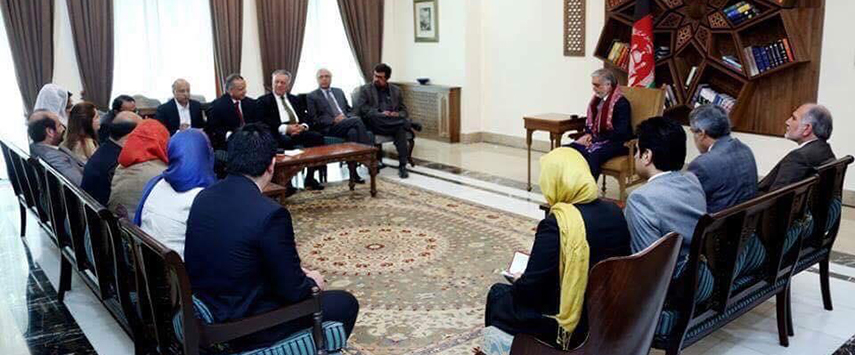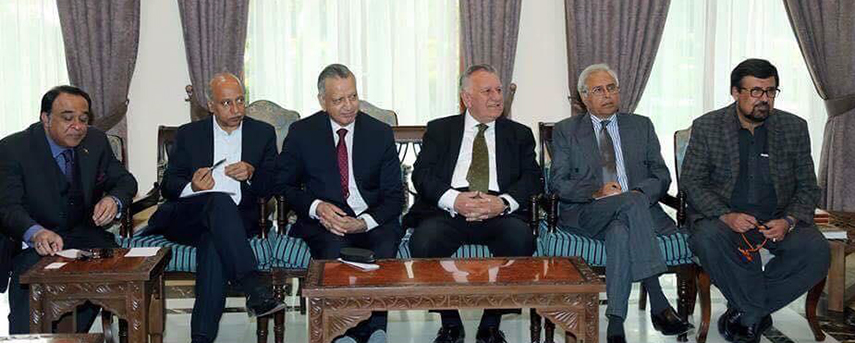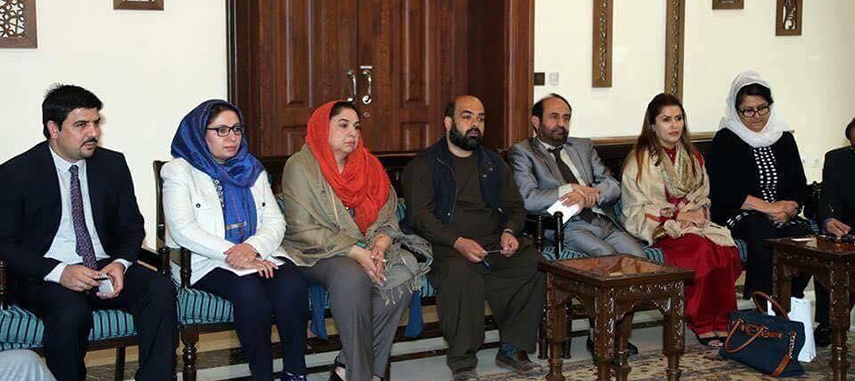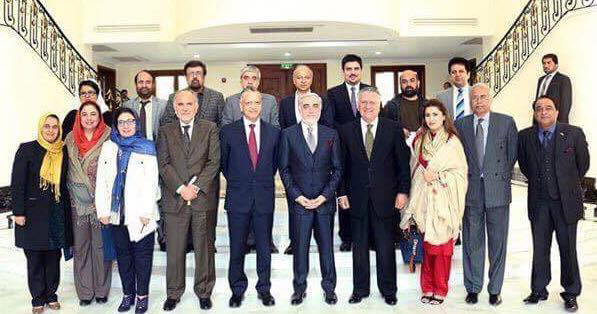The CRSS-WPSO track II Beyond Boundaries project’s Pakistan Afghanistan Joint Committee (PAJC) members from both the countries met with the Chief Executive of Afghanistan, H.E Dr. Abdullah Abdullah on Wednesday 16 November, 2016, at his office.
The Pakistani side comprised Dr. Shoaib Suddle, former IG Police and federal tax ombudsman; Shazia Marri, Member of Parliament; Qazi Humayun, former ambassador; Mian Sanaullah, former ambassador; and Tahir Khan, senior journalist. The Afghanistan side included Khalid Pashtoon, Member of Parliament; Elay Ershad, Member of Parliament; Sayed Qutbudin Roydar, former deputy minister for parliamentary affairs; Mozammil Shinwari, former deputy minister for trade & commerce; Abdul Hakeem Mujahid, head of executive council of the High Peace Council; Palwasha Hassan, civil society leader; and Bilal Sarwary, senior journalist.
The meeting proved to be very positive and productive as Dr. Abdullah welcomed both the civil society groups, thanked the organizations and delegates of both the countries and appreciated them for continuing to engage in the civil society dialogue series aimed to help improve Afghanistan Pakistan relations. He said: “these efforts are much needed and appreciated, even though the ground realities can be different, but engagement is very important, and you as civil society representatives from both the countries are moving in the right direction”.
Khalid Pashtoon gave a brief of the second meeting of PAJC held at Mazar-e- Sharif on 14 November, 2016 including the core issues discussed in the meeting; peace and security, refugees, trade, education and scholarship programmes, Pakistan funded projects in Afghanistan, and Media, Arts and Culture. He apprised Abdullah of the policy recommendations formulated in the meeting on these important issues.
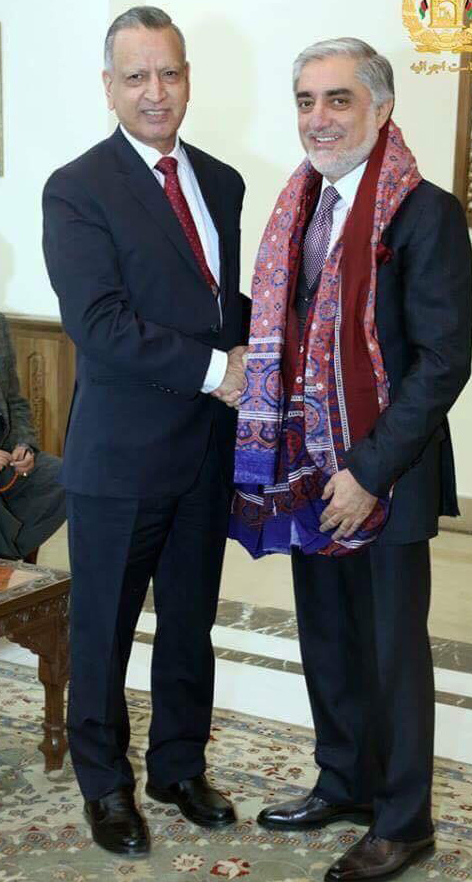 Shoaib Suddle briefed him on the previous meetings of Beyond Boundaries phase I, six meetings held between November, 2015 to March, 2016, and also on the first meeting of Beyond Boundaries phase II PAJC groups held in Lahore and Islamabad from 18 to 22 October, 2016. Dr. Suddle said: “even if we take baby steps, it will be a huge success; we should try that things should not get out of hands. The process is going to be difficult, but there is no other option, talks must continue, as both countries have suffered a lot. We are grateful that you have spared time to meet us”. He also informed the chief executive that the Pakistan group had visited the ongoing Pakistan funded projects in Kabul, namely Jinnah Hospital, and Rehman Baba School and Hostel, and apprised of some of the problems faced at these projects, most notably the issue of custom tariff and other duties exemption for the medical equipment to be imported by Pakistan for the use at Jinnah Hospital.
Shoaib Suddle briefed him on the previous meetings of Beyond Boundaries phase I, six meetings held between November, 2015 to March, 2016, and also on the first meeting of Beyond Boundaries phase II PAJC groups held in Lahore and Islamabad from 18 to 22 October, 2016. Dr. Suddle said: “even if we take baby steps, it will be a huge success; we should try that things should not get out of hands. The process is going to be difficult, but there is no other option, talks must continue, as both countries have suffered a lot. We are grateful that you have spared time to meet us”. He also informed the chief executive that the Pakistan group had visited the ongoing Pakistan funded projects in Kabul, namely Jinnah Hospital, and Rehman Baba School and Hostel, and apprised of some of the problems faced at these projects, most notably the issue of custom tariff and other duties exemption for the medical equipment to be imported by Pakistan for the use at Jinnah Hospital.
Abdullah said that his government wants good ties with Pakistan, and he is looking forward to his visit to Pakistan. He assured the two sides of full cooperation towards this initiative and promised to look at the difficulties of projects funded by Pakistan, assuring to resolve the problems and hurdles: “All these projects are for us, for the people of Afghanistan, we are grateful to Pakistan for taking up these projects here. We will try to resolve any problems at our end. It will be done for the benefit of our people”. He assigned the members of Afghan group to follow up and present him a report of the problems faced at these projects.
Imtiaz Gul, Executive Diretor, CRSS gave a rundown of the PAJC meetings with Pakistan’s Federal Minister for States and Frontier Regions (SAFRON), Gen. Abdul Qadir Baloch, and the Advisor on Foreign Affairs to the Prime Minister, Sartaj Aziz, during the meeting held last month in Islamabad. Gul informed the chief executive that yesterday an All Parties Conference was held in Islamabad to deal with all the issues relating to Afghan Refugees, and the consensus was that the process should be done with dignity and honor to help the refugees being repatriated.
Mozammil Shinwari shared same views: “we had very good meetings with Sartaj Aziz and Abdul Qadir Baloch, and also very useful interactions with young students of Lahore University of Management Sciences (LUMS) and Forman Christian College University (FCCU), The general perception in Pakistan of Afghanistan is good”, he remarked.
Shazia Marri also thanked Dr. Abdullah for meeting with the groups, she said: “this is my third visit to Afghanistan as part of this initiative. Such interactions help us understand the situation on ground. We need to look forward together, and work together for next generations of our two countries”. She noted that we can use such endeavors to improve relations and people-to-people contact. “We urge you to further the cause that the two groups have taken on”, she said.
Bilal Sarwary stated that they had good talks but at the same time they also discussed Pakistan’s (alleged) support to Haqqani network and Taliban and other controversial allegations and accusations. Dr. Abdullah cut him short while he was going on: “why do you want to talk about problems and of the past, when you have made such remarkable achievement through this dialogue, lets concentrate on the positives that you discussed”, he remarked.
Qazi Humayun while talking to the chief executive expressed: “we have to live together; we have to handle relations in a manner that we can co-exist. Both sides need to improve perceptions on either side”. While speaking on the Afghan refugees issue he remarked: “we have welcomed the refugees for about four decades now; we do not want to wash away all hospitality and good work because of some harsh treatment by a few elements”.
Dr. Abdullah appreciated Pakistan’s hospitality towards the Afghan refugees: “they have been hosted there for decades, though they have faced some hardships, but generally they have been looked after well. We do not want this to be damaged towards the end when they are returning to Afghanistan”.
Mian Sanaullah told the chief executive that he would like to convey the same feelings for improvement of Pak-Afghan bilateral relations, but we need positive statements coming out of the Afghan leadership. Dr. Abdullah responded by saying: “we will make sure that issues are solved when we have our state level interactions”.
Abdullah informed the Pakistani group that his government desires good relations with Pakistan, and that he is looking forward to his visit to Pakistan noting: “my visit to Pakistan was delayed because of certain pressing issues here. But, I look forward to visiting Pakistan sometime in the near future”.
Towards the end, Abdullah said that terrorism and extremism remain a hard challenge for both countries, but, we have to protect our future generations and to provide them with better peaceful situation.
The Afghan- Pakistan groups and the implementing organizations CRSS and WPSO thanked the chief executive for meeting with the group, and appreciated the fact that the discussions were held in a very cordial, open, and friendly manner and that they felt reassured with the positives coming out from this meeting through assurances given by the chief executive.

